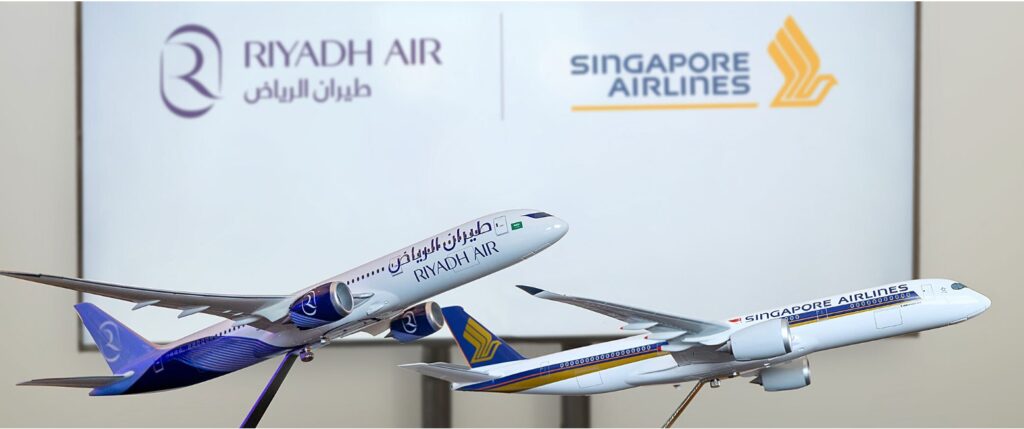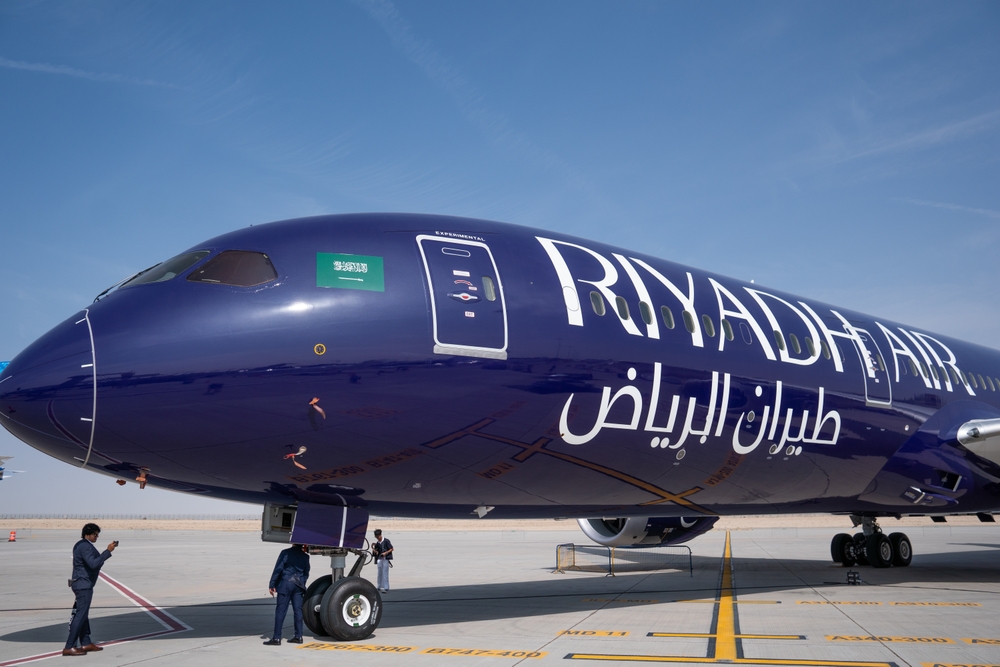Riyadh Air marked an important milestone in its development on June 3, 2024, by signing deals agreeing to cooperate with both Singapore Airlines and Air China at the 80th International Air Transport Association (IATA) Annual General Meeting (AGM) in Dubai.
Riyadh Air is a new airline based in Saudi Arabia, and it is expected to commence commercial operations in 2025, offering customers travel options to and from the Middle East.
Riyadh Air has previously announced that its growth strategy would be based on forming commercial collaboration agreements with other carriers, opting to build a “virtual network” rather than a huge fleet and route network like its Middle Eastern counterparts, Emirates, Eithad, and Qatar Airways.
The carrier signed a Memorandum of Understanding (MoU) with Singapore Airlines (SIA) to establish a new partnership between the two airlines and to explore further areas of cooperation. The agreement was signed by Riyadh Air’s Chief Executive Officer (CEO) Tony Douglas and Singapore Airlines CEO Goh Choon.

Under the MoU, the carriers will explore opportunities for interline connectivity on each other’s services, subject to regulatory approval. They will also work on other potential areas of commercial cooperation, including codeshare arrangements, reciprocal benefits for their frequent flyer program members, cargo services, customer experience, and digital innovation as a precursor to a deeper, long-term, strategic partnership.
The perceived opportunities will potentially offer Riyadh Air’s guests access to SIA’s network in Southeast Asia and the Southwest Pacific region, as well as SIA’s customers greater access to the Middle East region through Riyadh Air’s network. For Riyadh Air, the deal could help the airline punch into the Asia markets much quicker when it launches in 2025.
‘Our strategic partnership with Singapore Airlines unlocks significant benefits for our future guests as it grows our network in partnership with the World’s Best Airline,” said Douglas. “We see huge potential for strong connectivity in South East Asia and both Australia and New Zealand through the award-winning hub at Singapore Changi Airport, while also providing opportunities for westbound passengers to connect across the Kingdom of Saudi Arabia and the Middle East region on Riyadh Air.”
“This relationship is a meaningful and deep cooperation that starts with a wide-ranging codeshare agreement and is expected to include a broad range of areas including digital and technology, loyalty, and cargo,” he added.
“This win-win strategic partnership with Riyadh Air will enable us to offer even more options, enhanced connectivity, and greater benefits to our customers,” said Goh. “Together, we can facilitate the growth of passenger travel between Saudi Arabia and Singapore, and beyond, via our respective networks, supporting both tourism and business links.”
“The MoU will also allow us to find ways to work together to enhance customer experience and cargo services and harness digital tools and solutions, potentially bringing greater benefits to both airlines in the future,” Goh commented.
Meanwhile, Riyadh Air’s Douglas has been busy announcing a similar agreement with Air China. Following the success of the recently started Air China flights between Beijing (PEK) and Riyadh (RUH), both airlines have signed an MoU to explore opportunities for connectivity in both Beijing and Riyadh, two major G20 capital cities. Both airlines will work together on potential cooperation in business subjects, including interline traffic, codeshares, and more.
Codeshares key to growth strategy
Riyadh Air, Saudi Arabia’s new national carrier alongside Saudia, has just celebrated the first anniversary of its incorporation and aims to connect passengers to 100 destinations globally by 2030. One of the purposes of the new airline is to assist the Kingdom of Saudi Arabia in reaching its goal of attracting 150 million visitors to the country annually goal that same year. Headed by the former chief of Abu Dhabi’s Etihad Airways, the carrier says it will create 200,000 jobs by the end of the decade and contribute billions to the local economy.
While Riyadh Air has the cash to build a large fleet (it already has orders for 39 Boeing 787-9 Dreamliners with another 33 options), it may struggle to build its desired aircraft fleet as quickly as it might like. This is primarily due to supply chain issues at Boeing plus a lack of delivery positions available in the coming years as order backlogs grow.
Should Riyadh Air see delays in its fleet, codeshare deals could help the carrier grow its networks even without having its full fleet of Boeing 787s on strength. Riyadh Air has already signed commercial cooperation agreements with Saudia, as well as Turkish Airlines, with more expected to be announced in the coming months.

